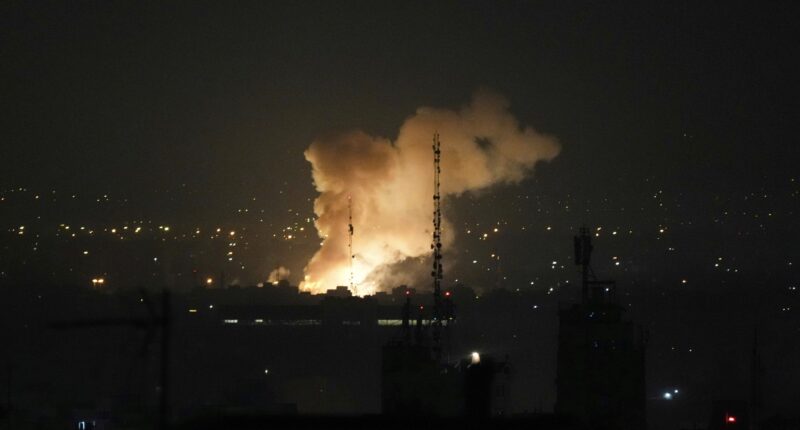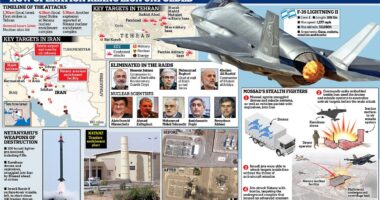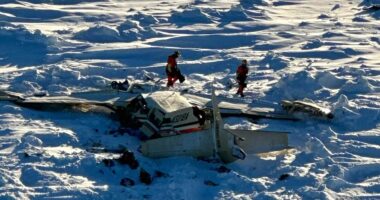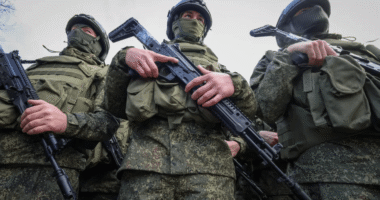THE Middle East stands on the brink of all-out war after Israel unleashed a massive wave of missile strikes on Iran – with Tehran then responding with a wave of drones.
Israeli forces targeted Tehran’s nuclear facilities and killed top military & scientific figures in a lightning offensive dubbed Operation Rising Lion.




Israel appears to have defied urges for restraint – including from US President Donald Trump – and said they were responding to the imminent danger that Tehran would obtain a nuclear weapon.
Iran have vowed vengeance, already begun to blame the US, and have launched at least 100 drones towards Israel, which are expected to hit in the next few hours.
The strikes came just days before Iran was due to meet with the US for another round of nuclear talks to try and strike a deal.
In a ferocious show of force, around 200 Israeli fighter jets roared across Iranian skies early Friday.
The Israeli Defence Force (IDF) said they used 330 munitions on 100 targets, including uranium enrichment plants and key command centres.
Major strikes have taken place on Iran’s military bases, the homes of top officials and nuclear sites such as the uranium enrichment base at Natanz .
And the heads of Iran’s armed forces – Revolutionary Guards commander Hossein Salami and Iranian chief of state Mohammad Bagheri – have both been killed.
At least two nuclear scientists – Fereydoon Abbasi and Mohammad – have also been killed, says Iranian state TV.
The Israeli military called the blitz a “pre-emptive, precise, combined offensive based on high-quality intelligence” and confirmed it had struck nuclear and missile sites across the country.
The IDF said in a statement: “Dozens of IAF jets completed the first stage that included strikes on dozens of military targets, including nuclear targets in different areas of Iran.”
Iran has vowed “severe punishment”, calling the strikes a “cowardly” act of aggression as fears mount of a devastating counterstrike.
In a fiery statement, Tehran said the assault “shows why Iran insists on enrichment, nuclear technology, and missile power,” framing the attack as proof of its need for deterrence.


A “special state of emergency” is now in effect in Israel.
Air raid sirens blared across the country in the early hours, with residents jolted awake by alerts warning of an imminent missile and drone attack.
Israeli Prime Minister Benjamin Netanyahu called the assault vital to “roll back the Iranian threat to Israel’s very survival”, vowing the campaign would last “as many days as it takes to remove the threat.”
He accused Tehran of advancing toward a nuclear weapon, claiming Iran had enriched enough uranium for “nine atom bombs.”
“In recent months, Iran has taken steps that it has never taken before – steps to weaponize this enriched uranium,” Netanyahu said.
“This is a clear and present danger to Israel’s very survival.”
Explosions rocked military sites northeast of Tehran, including the Mahalati complex.
Revolutionary Guard commander Hossein Salami, top nuclear scientist Fereydoun Abbasi, theoretical physicist Dr Mohammed Mehdi Tehranchi, and Major General Gholam Ali Rashid were among those killed.
Supreme Leader Ayatollah Ali Khamenei accused Israel of targeting residential areas, saying: “In the enemy’s attacks, a number of commanders and scientists were martyred.
“Their successors and colleagues will immediately continue their duties.”
The International Atomic Energy Agency confirmed the Natanz nuclear facility was struck and said it was in contact with Iranian officials regarding radiation concerns.
U.S. Secretary of State Marco Rubio insisted Washington was not involved, though he said “necessary steps” were being taken to protect American personnel in the region.
“Let me be clear: Iran should not target US interests or personnel,” Rubio warned.
He backed Israel’s right to self-defence, saying it “believes the strikes are necessary.”
Stay up to date with the latest on Israel vs Iran with The Sun’s live blog
-
Israeli Air Force releases video of fighter jets prior to Iran attacks
-
IDF: Iran had ‘concrete plan’ to destroy Israel, coordinated with Hamas and Hezbollah
The Israeli military says it has uncovered a “concrete plan” by Iran to destroy Israel.
Tehran was accused of preparing a large-scale, multi-front offensive while simultaneously pursuing nuclear weapons.
In a new statement, the IDF claimed Iran had been “manufacturing tens of thousands of missiles and UAVs” and advancing efforts to “obtain nuclear weapons”.
The statement alleges Iran had developed a coordinated strategy, reportedly called “The Destruction of Israel Plan”, which included a combined ground offensive on multiple fronts – involving Hamas and Hezbollah.
“The State of Israel was left with no choice,” the IDF said.
“The IDF is obligated to act in order to defend the citizens of the State of Israel and will continue to do so.”
Israeli intelligence reportedly revealed efforts by Iran to re-arm terrorist organisations, with what officials describe as “vast quantities of intelligence materials” showing coordination between Tehran and the leaders of Hamas and Hezbollah.
-
What we know so far
If you’re just joining us, here’s a quick recap of the rapidly developing situation:
- Israel has launched major airstrikes across Iran, claiming to target the “heart” of Iran’s nuclear programme in a sweeping military operation.
- Hossein Salami, chief of Iran’s elite Islamic Revolutionary Guards, and several nuclear scientists have been killed, according to Iranian state media.
- Israeli Prime Minister Benjamin Netanyahu said it was a “targeted military operation to roll back the Iranian threat to Israel’s very survival,” warning that Iran could produce a nuclear weapon “in a very short time.”
- A state of emergency has been declared in Israel, with authorities bracing for imminent counter-attacks.
- US Secretary of State Marco Rubio stated the US was not involved and provided no assistance in the strikes.
- A spokesperson for Iran’s armed forces has vowed that both the US and Israel “will pay a heavy price.”
-
In pictures: Aftermath of strikes in Tehran
We are starting to get the first daylight pictures of the Iranian capital following Israel’s Operation Rising Lion.

Credit: Getty 
Credit: Reuters 
Credit: Getty 
Credit: Getty -
No radiation spike at Natanz after Israeli strikes – UN nuclear watchdog
No increase in radiation levels have been detected at Iran’s Natanz uranium enrichment facility, the United Nations’ nuclear watchdog has confirmed.
“Iranian authorities have informed the IAEA… that no increase in radiation levels has been observed at the Natanz site,” the International Atomic Energy Agency (IAEA) said in a post on X.
The agency previously confirmed that Natanz was among the targets struck by Israeli forces during Operation Rising Lion.
The IAEA also noted that Iran’s only nuclear power plant, located in the southern port city of Bushehr, had not been targeted in the wave of airstrikes.
The agency said it remains in contact with Iranian officials to monitor the situation.
-
Statement from US Secretary of State Marco Rubio
-
Who were the ones killed in Israel’s attack on Iran?
Iranian state TV has confirmed the deaths of several of the country’s most senior military and nuclear figures in the wake of Israel’s massive air assault.
Among those killed were Hossein Salami, commander-in-chief of the elite Islamic Revolutionary Guard Corps (IRGC), and Major General Mohammad Bagheri, the overall commander of Iran’s armed forces, including the IRGC and regular army.
The strikes also claimed the lives of at least two prominent nuclear scientists: Fereydoon Abbasi, former head of the Atomic Energy Organization of Iran, and Mohammad Mehdi Tehranchi, president of Islamic Azad University in Tehran.

Hossein Salami, commander-in-chief of the elite Islamic Revolutionary Guard Corps (IRGC)Credit: EPA 
Iranian Armed Forces Chief of Staff Major General Mohammad BagheriCredit: AFP 
Mohammad Mehdi Tehranchi, president of the Islamic Azad University (right)Credit: Getty 
Fereydoon Abbasi Davani, head of Iran’s Atomic Energy OrganisationCredit: AFP -
Starmer calls for ‘restraint and calm’
Sir Keir Starmer has urged all sides to de-escalate following Israel’s dramatic airstrikes on Iran, warning that the situation demands immediate diplomatic action.
The Government, he said, is calling on “all parties to step back and reduce tensions urgently.”
“Now is the time for restraint, calm and a return to diplomacy,” the PM added, as fears grow of a wider regional conflict.
-
UK’s David Lammy warns of ‘dangerous moment’ after Israeli strikes on Iran
UK Foreign Secretary David Lammy has voiced concern over Israel’s overnight strikes on Iran’s nuclear programme, warning of the growing threat to regional and global stability.
Lammy said in a post on X: “Stability in the Middle East is vital for global security.
“I’m concerned to see reports of strikes overnight. Further escalation is a serious threat to peace & stability in the region and in no one’s interest.”
He added: “This is a dangerous moment & I urge all parties to show restraint.”

Credit: PA
-
Scenes of destruction in Tehran early on Friday
Credit: AFP Credit: AFP Credit: AFP -
Scenes of destruction in Tehran early on Friday

Credit: AFP 
Credit: AFP 
Credit: AFP -
200 Israeli jets hit 100 Iranian targets in massive strike
In its ferocious aerial assault, Israel used 200 fighter jets to pound 100 strategic targets across Iran.
So far, 330 munitions have been dropped in the operation, which has focused on eliminating senior Iranian officials and taking out high-value nuclear and missile infrastructure.
Among the targets hit were nuclear facilities, missile bases, and key command centres in what Israel has described as a precision offensive aimed at crippling Iran’s military and nuclear capabilities.
-
IDF statement on Israeli strike
-
Netanyahu: Operation Rising Lion will continue ‘as many days as it takes’
Benjamin Netanyahu has called Operation Rising Lion a decisive move to neutralise the Iranian threat, vowing the strikes will not stop until the job is done.
The Israeli PM said: “Moments ago, Israel launched Operation Rising Lion, a targeted military operation to roll back the Iranian threat to Israel’s very survival.”
He made it clear the campaign will be sustained and uncompromising.
“This operation will continue for as many days as it takes to remove this threat,” he declared, signalling that Israel is prepared for a prolonged military engagement.

Credit: X/@IsraeliPM -
Iran launches drone barrage at Israel
More than 100 Iranian drones were launched toward Israel in direct retaliation for Israel’s massive airstrikes on Tehran.
Brig. Gen. Effie Deffrin, Israel’s chief army spokesman said: “In the last few hours, Iran has launched more than 100 drones toward Israel, and all the defense systems are acting to intercept the threats.”
It follows Israel’s ongoing Operation Rising Lion, which saw 200 Israeli fighter jets strike around 100 targets inside Iran, including nuclear and military sites.
According to Deffrin, the offensive is still in progress.
Jordan’s civil aviation authority announced it has closed its airspace to all flights, joining other regional countries in locking down skies amid fears of being caught in the crossfire.
The Jordan News Agency called it a temporary safety measure, citing “any dangers related to the escalation in the region.”
With drones in the air and warplanes still flying, the Middle East is now bracing for what could become a long and dangerous confrontation.

















